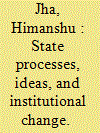| Srl | Item |
| 1 |
ID:
143826


|
|
|
|
|
| Summary/Abstract |
In a modern democratic state, civil society that includes Non Government Organisations (NGOs) is an important governance actor. With increasing demand for policy change as part of governance reforms, governmentNGO-donor collaboration emerged to facilitate the process. Governance of collaboration or collaborative governance has been instrumental in policy changes across countries and sectors. However, the collaborative governance literature predominantly focus on in-country and local cases of “consensusoriented decision making” by multiple stakeholders in wide range of fields. This article attempts to fill the gaps in literature by showing first that collaborative governance can be a tool of policy changes not just day-to-day policy choices, and second, the ‘transnational’ dimension of collaborative governance, in which case foreign or multilateral actors join with local and national actors in decision making - a frequent phenomenon in many countries of the global south that receive development assistance. The article examines the role of collaborative governance in policy change through a case study of the Right to Information (RTI) legal reform in Bangladesh. It adopts the general model of collaborative governance as depicted in Chris Ansell and Alison Gash’s seminal piece ‘Collaborative Governance in Theory and Practice’ to explain government-NGO-donor collaboration over RTI law in Bangladesh.
|
|
|
|
|
|
|
|
|
|
|
|
|
|
|
|
| 2 |
ID:
177875


|
|
|
|
|
| Summary/Abstract |
This essay analyses the implementation of China’s Regulations on Open Government Information (ROGI), an important piece of legislation that establishes Chinese citizens’ right to information. By international standards, the ROGI only offers relatively weak protection for this right, but Chinese citizens and civil society organisations have used the ROGI creatively to pursue a variety of goals from private rights protection to public interest advocacy. Strong civic activism has been a major driving force behind the gradual progress in public access to government information that has been achieved since the ROGI came into effect in 2008.
|
|
|
|
|
|
|
|
|
|
|
|
|
|
|
|
| 3 |
ID:
082764


|
|
|
| 4 |
ID:
070492


|
|
|
| 5 |
ID:
159538


|
|
|
|
|
| Summary/Abstract |
Historically, the Indian state has embraced the norm of secrecy. Yet despite this legacy, in 2005 India passed the Right to Information Act (RTIA). What explains this institutional change in India’s information regime? The mainstream literature overlooks significant historical evidence, which I deploy to demonstrate that ideas on openness emerged as part of the opposition politics within the state after independence in 1947, gradually and incrementally became part of mainstream politics, and eventually led to the RTIA. I propose a largely endogenous model of institutional change that builds on gradual changes to finally reach a threshold—or tipping point.
|
|
|
|
|
|
|
|
|
|
|
|
|
|
|
|